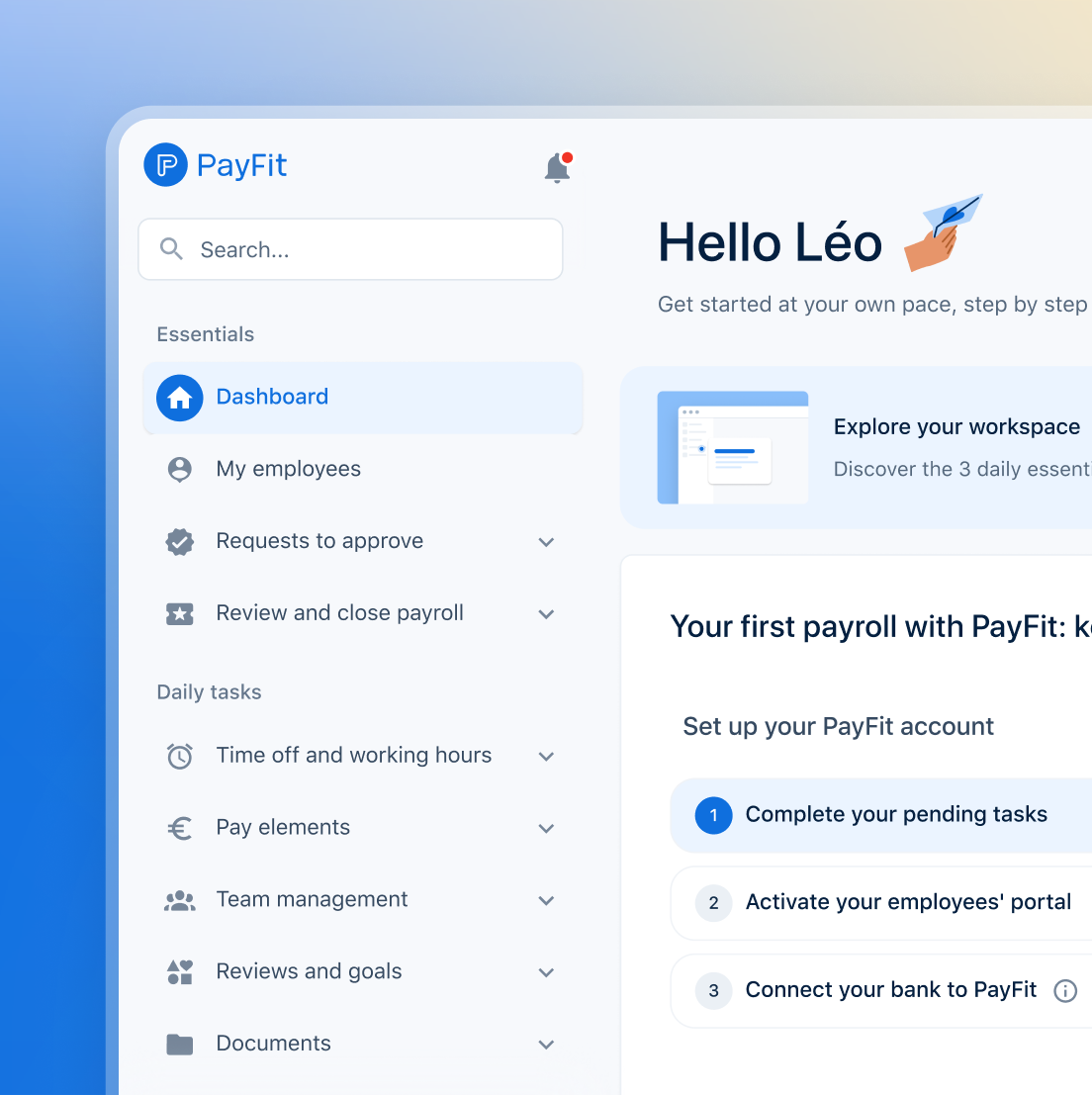✨ Health insurance, now in PayFit - learn more
💷 All the rates & thresholds you need to know for 25/26...right here
✨ The Payroll Journey: Start, Scale & Succeed Globally - learn more
✨ Health insurance, now in PayFit - learn more
💷 All the rates & thresholds you need to know for 25/26...right here
✨ The Payroll Journey: Start, Scale & Succeed Globally - learn more


Employment laws exist to protect both the employer and their employees. So, understanding your legal obligations as an employer is essential if you want to avoid severely damaging your reputation or having to participate in legal proceedings like employment tribunals.
This guide explains what UK employment law is, the major laws and rights employees are entitled to and recent changes to legislation you should be aware of.
Employment law is the umbrella term representing all labour laws in the United Kingdom that govern the employee-employer relationship. It covers everything from employment contract terms to dismissal and grievance procedures and dispute resolution. This UK work legislation is there to protect both the employer and the employee and establish clear rights and responsibilities for both parties.
When you think of employment law, you might immediately think it protects just the employee, but that’s not the case. It exists to protect the employer, too, providing them with frameworks should any problems arise.
Having structured frameworks to abide by helps employers understand their legal obligations and ensure all their policies are consistent and fair. These frameworks also protect them should unfair claims come to the surface.
Employment laws like those surrounding redundancy and dismissal procedures help give employers sufficient information to navigate these tricky situations in a fair and lawful way. The laws ensure hiring is fair and free from discrimination, and they keep employers accountable to legal entitlements surrounding paid and unpaid leave.
Employment statutes in the UK also play a vital role in employee management for all employers, regardless of how small or established their business is.
There are certain rights employees are entitled to, here are three of the basic ones:
Written terms of employment. Employees have the right to receive written terms of employment. These terms should outline their role and responsibilities.
National Minimum Wage. You must pay employees at least the National Minimum Wage.
Paid annual leave. Employers must pay employees the minimum statutory leave. Employees who work five days a week should receive 5.6 weeks of paid holiday a year.
Beyond these statutory employment rights, employers must also meet ongoing payroll compliance obligations throughout the tax year, including monthly HMRC reporting (RTI), PAYE payments, pension contributions, and statutory payment claims. Managing both employment law and payroll compliance requirements systematically — for example, using a UK payroll compliance checklist for payroll obligations — ensures complete regulatory compliance.
2026 payroll checklist
This is the main act most people are familiar with; it’s the act that fundamentally outlines the rights and responsibilities of both employers and employees. Including the following:
Employee legal rights include:
Right to receive the national minimum wage
Access to all statutory rights from day one of employment (leave, rest breaks, etc.)
Protection against unfair dismissal after two years of continuous employment
And many more.
Employer responsibilities include:
Must provide a written statement of employment details
Implement fair dismissal and redundancy policies
Ensuring compliance with working time regulations
And more.
The national minimum wage is enforced by HMRC, which means they can investigate any employer they feel is not complying. The National Minimum Wage Act creates a statutory minimum hourly wage for every worker in the UK, including school-leaving-age children, agency workers and anyone on a zero-hour contract.
From April 2024, the National Minimum Wage all employers must pay is:
Age 21+
Age 18-20
Under 18
Apprentice
£11.44/hour
£8.60/hour
£6.40/hour
£6.40/hour
This act fundamentally changed UK labour laws for the better, putting the power into the hands of employees in places where it matters. With this act, trade unions can now bargain with employers with over 20 staff members, give employees the right to be accompanied by a colleague or trade union representative at grievance or disciplinary meetings and enforce three months of unpaid leave for employees to care for a child, amongst other rights and protection.
The act essentially outlines maternity and paternity leave rights, so as an employer, you must be aware of what employees are entitled to. This means granting up to 52 weeks of maternity leave and one or two weeks of paternity leave.
If a company changes ownership, for example, TUPE protects employee rights. From ensuring they’re not dismissed due to the new ownership transfer to preserving their terms and conditions of employment.
With these regulations, part-time workers are afforded the same treatment as full-time employees. That means their pay and benefits should be equal to that of full-time workers (albeit proportional); they should have access to the same workplace benefits and training and development opportunities.
The Equality Act 2010 protects employees against nine discrimination characteristics:
Age
Disability
Gender reassignment
Marriage and civil partnership
Pregnancy and maternity
Race
Religion or belief
Sex
Sexual orientation
This means employers cannot discriminate based on any of the factors listed below. For example, you can’t treat one employee differently from any other employee or implement a policy that does not apply to or actively disadvantages anyone because of one of the above characteristics.
Although the UK already had an employment relations act (as mentioned above), in April 2024, the Employment Relations (Flexible Working) Act 2023 came into effect. This updated version now enables employees to make flexible working requests from day one of their employment rather than waiting 26 weeks into their new role to do so.
Employees can make two flexible working requests each year
And employers can’t simply reject the request; they must consult with the employee before reaching a decision
Employers must respond to the request within two months
A flexible working request could be to increase the number of hours worked on certain days to enable a four-day working week. Or a request to work remotely from home some days and in the office other times.
Other changes you should know about include the Carers Leave Act and 2024 changes to paternity leave.
In October 2024, the government also published the Employment Rights Bill 2023. Although the bill won’t pass until summer 2025, it poses exciting changes for employees, including expansion of day-one rights, guaranteed hours for zero-hour workers and big changes to the National Minimum Wage.
Still got some questions? We answer some frequently asked questions below.
Not all employee rights are granted to new employees. Usually, employees must have been continuously employed by your company for at least two years before they can access some rights. For example, they can’t claim unfair dismissal or claim statutory redundancy pay if they’ve worked with you less than two years.
There will be serious legal consequences if you don’t follow employment law legislation. From financial penalties to costly employment tribunals. Not to mention the damage it can do to your brand reputation, impact on current staff morale and general disruptions to business operations. Simply put, not complying with employment legislation is not worth the risk.
You can visit acas for free work and employment law advice. Here you can learn more about what should be included in your employment contracts or just have simple questions answered, maybe you want to understand more about the process of redundancy, for example.
Other places you can visit for advice (although not all free) include specialist employment law solicitors or Peninsula HR services. Some professional associations, such as the Chamber of Commerce, also offer businesses access to unlimited HR support to their members.
Our HR and payroll software goes above and beyond to ensure your company remains compliant with all UK employment regulations.
We keep on top of the latest legal changes. Keeping up-to-date with legal changes and employer requirements can be tedious. That’s why we do it for you; we regularly update our software to ensure it reflects the latest legal developments and employer requirements, helping you avoid fines and penalties.
Automated compliance features. These include automatic RTI submissions to HMRC, so your submissions are always accurate and timely, avoiding any pesky HMRC fines. You can also enjoy auto-enrolment, pension submission and GDPR compliance.
Automatic calculations. We’ll automatically calculate the correct holiday pay, maternity, paternity, adoption leave — you name it. Any statutory leave, we’ll do all the calculations for you and update your employees’ digital payslips in one go, keeping everyone happy and informed.
Experts on hand. On top of all this, our expert support team is on hand to help answer any HR or payroll queries (CIPP-qualified payroll experts) you have. From guidance on implementing policies to best using our features and everything in between.
Itching to know more? Book a free demo of our software and a member of our friendly team will show you how everything works!


Learn what the Carer’s Leave Act means in 2026: carers’ rights, how leave works, notice rules, postponement, and policy steps for employers.

Is paternity leave 14 working days in the UK in 2026? Learn how long paternity leave lasts, who is eligible, how pay works and what notice is required.

Learn what Labour’s 4-day week plans mean in 2026, plus your options now: flexible working, compressed hours, contracts, and HR actions.

What is the Alabaster ruling? Learn how pay rises during maternity leave affect Statutory Maternity Pay (SMP) and how to calculate arrears correctly.

A guide for employers on the Neonatal Care Act, in force since April 2025. Learn about leave entitlement, pay eligibility, notice periods & the two-tier system.

A new flexible working law came into effect in 2024. Employees have more say over how & when they work. Understand what it means for you as an employer.

See what's new in PayFit
New features to save you time and give you back control. Watch now to see what's possible